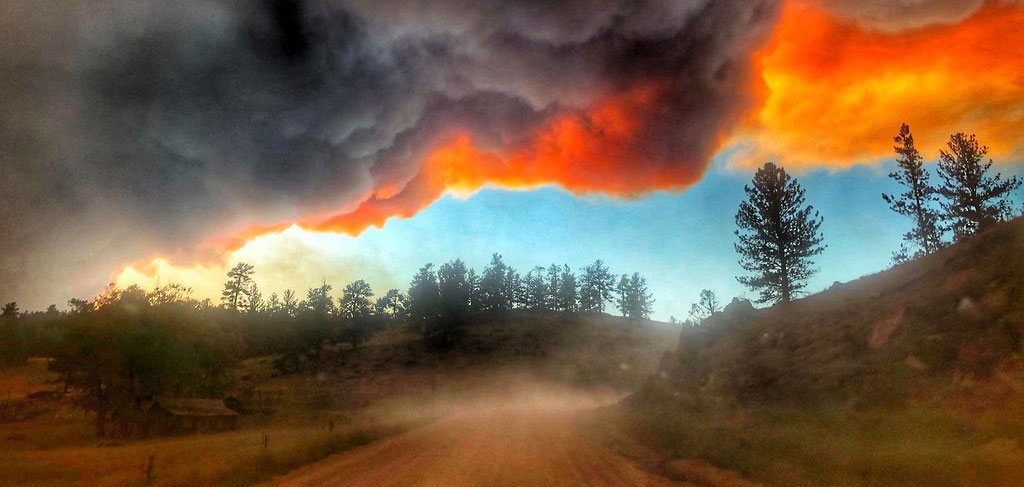Do Look Up

 In a recent review of Don’t Look Up, the terrifyingly close-to-home satire of collective inaction on global warming, Pablo Ortiz of the Union of Concerned Scientists suggests that one form of “looking up” is to write and share about how climate change is affecting you, as a means of building a larger movement. Granted, this suggestion is pretty tame when some climate scientists are taking direct action, such as chaining themselves to the White House fence after the release of the most recent IPCC report (one Facebook commentator quipped, “Remember when climate scientists were content to do research, publish papers, and issue dire warnings?”). Yet, taking Ortiz’s advice, I begin here by briefly describing one way climate change is affecting the place I live.
In a recent review of Don’t Look Up, the terrifyingly close-to-home satire of collective inaction on global warming, Pablo Ortiz of the Union of Concerned Scientists suggests that one form of “looking up” is to write and share about how climate change is affecting you, as a means of building a larger movement. Granted, this suggestion is pretty tame when some climate scientists are taking direct action, such as chaining themselves to the White House fence after the release of the most recent IPCC report (one Facebook commentator quipped, “Remember when climate scientists were content to do research, publish papers, and issue dire warnings?”). Yet, taking Ortiz’s advice, I begin here by briefly describing one way climate change is affecting the place I live.
Fire season in Colorado used to be the summer. Not anymore. In fact, there is no longer really a fire season; the landscape burns destructively year-round. On December 30, a once-unthinkable winter grassland fire destroyed more than 1000 houses and caused 1 billion USD in insured losses, just south of my neighborhood in Boulder, Colorado. Just three months later, another wildfire led to the mandatory evacuation of 19,000 people living in 8000 homes, including mine. That was March 26. On April 7, as I was heading home from the office, I received a message from my sixth-grade son, “another fire!” This one was very close to the March 26 fire, which was still burning. On April 19, there were four separate fires burning in Boulder County, leading to more evacuations. Half of the state’s 20 largest wildfires have happened since 2018. A new sense of dread now seeps through the pores of everyday life, deepening the enduring exhaustion of the pandemic.
I want to acknowledge here that crisis narratives about climate change have been critiqued by Indigenous scholars. Even though many of us are experiencing climate change as an unprecedented emergency, Indigenous peoples have already faced climate change in the form of territorial dispossession and displacement to new ecosystems and climates. Moreover, as Potawatomi environmental justice scholar Kyle Whyte reminds us, colonialism has long used perceived and real crises to defend unjust actions. He argues for an epistemology of coordination rather than crisis, one based on the importance of moral bonds or kinship relationships, as necessary for responding to change without further justifying violence. With these cautions in mind, though, I wonder if it isn’t still necessary to treat climate change as a crisis when it comes to the capitalist status quo of corporate profits and the discursive formation that makes us think there is no alternative.
* * * * *
This spring, several colleagues and I embarked on a modest effort to “look up,” in the form of authoring a faculty resolution calling on TIAA to divest from the climate crisis and reinvest in climate justice. Through TIAA-Divest!, an organization that works with faculty, staff and students to encourage TIAA to become a more responsible investor, we learned that even though TIAA represents itself as a “leader in responsible investing” and states that “climate change poses long-term risks to investments,” it invests at least 16 billion dollars in fossil fuel stocks, across 77 equity funds. Furthermore, the Brazilian federal land agency and a Brazilian state court found TIAA (and Harvard University’s endowment fund) to have violated foreign land ownership law in its acquisition of half a million acres of farmland, working through opaque corporate structures and shell companies. Though TIAA maintains that it was in compliance with the law, these investments have clearly aided land grabs from peasants and indigenous peoples, and contributed to deforestation and thus climate change.
In the US, TIAA directly financed 35% of the construction costs of Cricket Valley Energy, a fracked natural gas-powered electric generation station in Dover New York, in an economically disadvantaged community adjacent to one of the Northeast’s largest freshwater wetlands. This fracking operation drew protests across New York state. Even the company’s “social choice low carbon equity fund” is 3.17% invested in the oil and gas industry, and 12% invested in deforestation-risk companies across 25 holdings. The list of problems goes on. TIAA is hardly alone: Vanguard has a slightly higher percentage but an order of magnitude more fossil fuel investments. But we opted to focus on TIAA because it is the leading provider of financial services in higher education, and the only administrator of retirement funds available to faculty at my institution, as well as having a reputation as a company committed to social and environmental responsibility.
Divestment is not uncontroversial. Geographers and other researchers have shown that ESG (environmental, social, and governance) investing often amounts to little more than greenwashing, because of its unregulated nature and loose standards, as evidenced by wildly divergent ratings between different ESG rating agencies. The ESG movement is also partly resulting in what geographer Brett Christophers has called the “full-fledged romance between the fossil-fuel economy and private equity.” over the past decade. This is concerning given that private equity is far less accountable or transparent than public companies. More broadly, focusing only on ESG investment furthers capitalist logics of privatization and financialization. Big asset managers reap the benefits when they push governments to de-risk the clean energy transition for their private investments. This diverts resources from what is actually desperately needed for a just transition: public investment. None of this excellent critical work suggests, however, that divestment itself is the problem. When accompanied by calls for greater government regulation of investors and demands for public finance of the infrastructure necessary for an equitable low-carbon economic transition, divestment sends a much stronger message about the status quo than any dialogue that investors might have with corporate boards.
These arguments for public investment were, however, not the objections that our modest resolution on TIAA encountered. The most vigorous opposition came from a business school faculty member who insisted, “divestment doesn’t work” because there will always be someone who does not care about climate change and who will thus buy divested stocks divested at a low price, and then make a profit when those same stocks inevitably increase in value. The CEOs of those companies themselves might also play this gambit through stock options. Thus, the reasoning goes, we have only rewarded those who we wished to punish. This argument is both a red herring, because financial investors and CEOs are always trying to make a profit, and provides further evidence that regulation, of both fossil fuel emissions and markets, is needed.
When I asked what he thought those who cared about unfolding climate disasters should do instead of divestment, our colleague’s response was the pinnacle of neoliberalism: “Try to get other consumers to stop using fossil fuels.” The conviction that atomized individual consumers are the only possible source of change ignores the fundamental ways in which fossil fuels are embedded in our infrastructure, housing, and culture– unsurprising, since as geographer Matt Huber has argued, the history of American oil consumption has itself been central to the rise of neoliberalism in this country. Our business school critic also insisted that divestment is not justified by either volatile short-term fossil fuel equity prices or the impending stranded assets of fossil fuel corporations, since short term performance is meaningless and in the long run, we are all dead (no business retains value forever). Thus, a portfolio that eliminated fossil fuels is, by this definition, inferior since any constraint on investment is inevitably second-best. Presumably, this logic would also justify investing in industries that employ slave labor.
We argued back with the work of geographers and other scholars on multiple fronts. We quoted Kim Stanley Robinson’s The Ministry of the Future: “What’s the monetary value of human civilization? Trying to answer that question proves you are a moral and practical idiot.” I’m happy to report that through appeals to our campus leaders’ stated commitment to addressing climate change, the campus’ “reputational brand” for climate change research (one of the few arguments that spoke to the economists), the injustices of climate change, and our duties as educators, our resolution ultimately passed. Next, we are sending it to TIAA’s CEO and Board of Governors.
* * * * *
Research and science alone are not enough to make change. Organizing is always necessary, as we can see in both the TIAA effort and the direct action some climate scientists are now engaging in. It’s clear as well that we need government action — for example, for robust and convenient high-speed electrified rail infrastructure that would allow us to gather in low-carbon ways for scholarly exchange and networking; hopefully, more geographers will become involved in organized policy advocacy in this realm. Lastly, I am keenly aware of the contradiction between the focus of this column and the fact that the in-person component of the 2024 hybrid AAG annual meeting is scheduled to take place in Hawaii, a costly travel destination in terms of both dollars and carbon. This conference location was chosen many years ago and legal structures (of hotel contracts) preclude change. Can a significant number of geographers adopt an epistemology of coordination, perhaps in the form of many local, relationship-building nodes, as an alternative to carbon-costly air travel? Will we look up?
DOI: 10.14433/2017.0109
Please note: The ideas expressed in the AAG President’s column are not necessarily the views of the AAG as a whole. This column is traditionally a space in which the president may talk about their views or focus during their tenure as president of AAG, or spotlight their areas of professional work. Please feel free to email the president directly at emily [dot] yeh [at] colorado [dot] edu to enable a constructive discussion.


